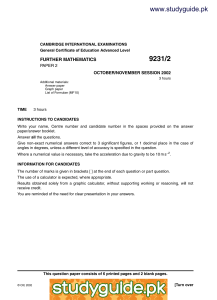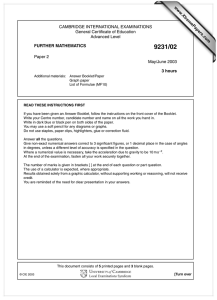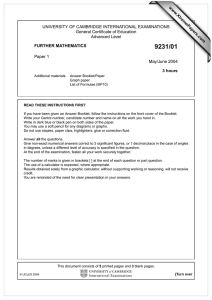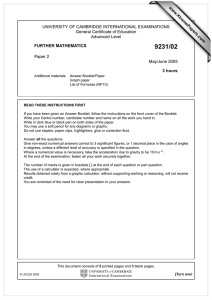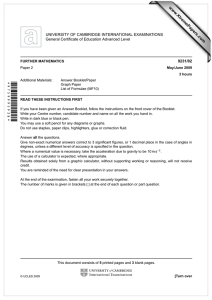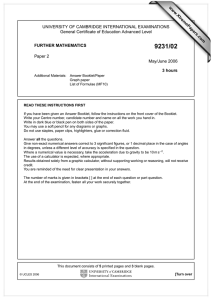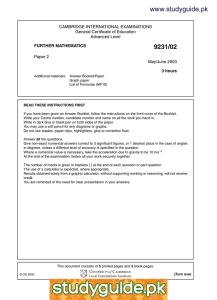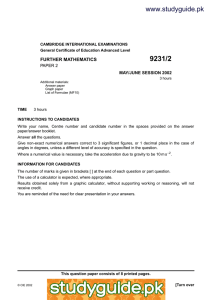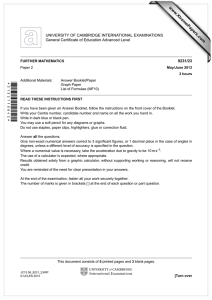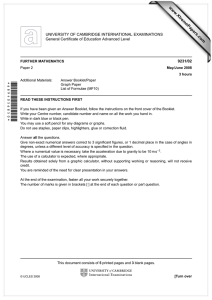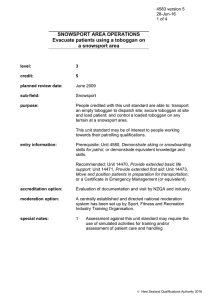9231/2 FURTHER MATHEMATICS www.XtremePapers.com PAPER 2
advertisement
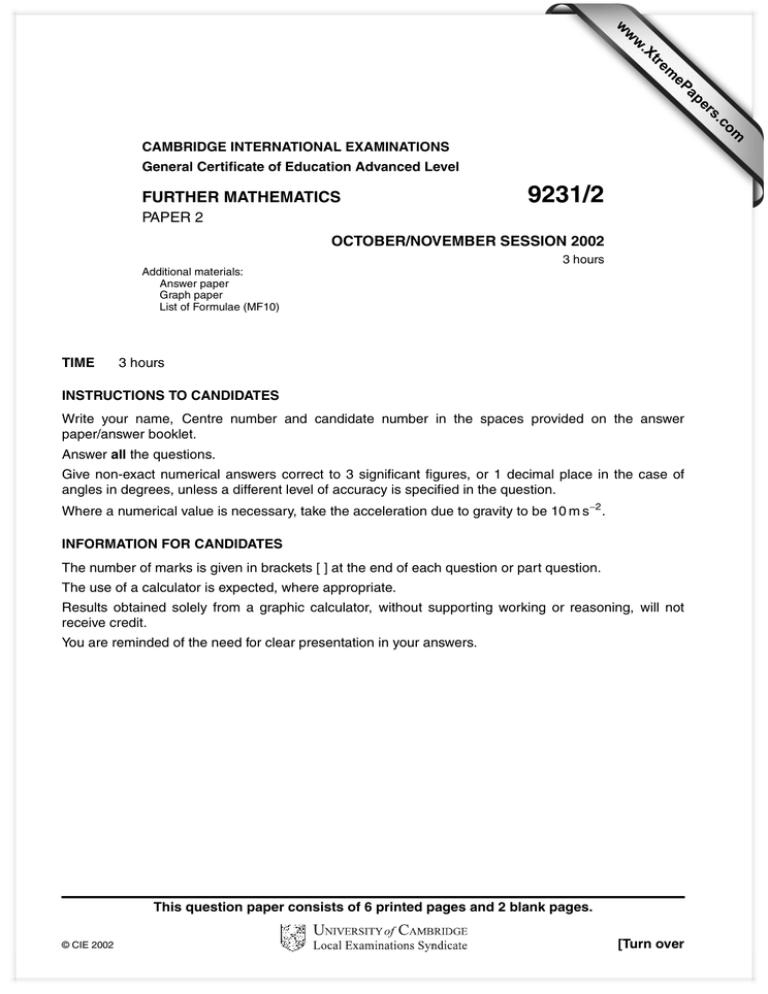
w
w
ap
eP
m
e
tr
.X
w
om
.c
s
er
CAMBRIDGE INTERNATIONAL EXAMINATIONS
General Certificate of Education Advanced Level
FURTHER MATHEMATICS
9231/2
PAPER 2
OCTOBER/NOVEMBER SESSION 2002
3 hours
Additional materials:
Answer paper
Graph paper
List of Formulae (MF10)
TIME
3 hours
INSTRUCTIONS TO CANDIDATES
Write your name, Centre number and candidate number in the spaces provided on the answer
paper/answer booklet.
Answer all the questions.
Give non-exact numerical answers correct to 3 significant figures, or 1 decimal place in the case of
angles in degrees, unless a different level of accuracy is specified in the question.
Where a numerical value is necessary, take the acceleration due to gravity to be 10 m s−2 .
INFORMATION FOR CANDIDATES
The number of marks is given in brackets [ ] at the end of each question or part question.
The use of a calculator is expected, where appropriate.
Results obtained solely from a graphic calculator, without supporting working or reasoning, will not
receive credit.
You are reminded of the need for clear presentation in your answers.
This question paper consists of 6 printed pages and 2 blank pages.
© CIE 2002
[Turn over
2
1
A uniform lamina of mass M is in the shape of a square of side 3a from which the four corner squares
of side a have been removed (see diagram). Show that its moment of inertia about an axis through its
centre C, perpendicular to its plane, is 29
Ma2 .
[5]
30
The plane of the lamina is vertical, and the lamina is free to rotate about a horizontal axis through one
of its corners, O. The lamina is held with C at the same level as O, and is released from rest. Air
resistance is negligible. Find the greatest angular speed of the lamina in the case when a = 0.2 m. [4]
2
A ball P of mass m kg is dropped from a point A, which is 2 m vertically above a point B on a horizontal
floor. After P hits the floor at B, it rebounds and hits another ball Q, of the same mass, which has also
been dropped from A. The impact between the two balls is direct and takes place at the mid-point of
AB. The coefficient of restitution in each impact is 57 . Neglecting air resistance, find the speed of P
(i) immediately after it hits the floor,
[3]
(ii) immediately after it collides with Q.
[7]
9231/2/O/N/02
3
3
A uniform circular disc of weight W rests in a vertical plane on a horizontal floor and against a vertical
wall, the points of contact being A and B respectively. The disc is perpendicular to the wall. A force
of magnitude P acts tangentially at a point C on the edge of the disc, where the radius to C makes an
acute angle θ with the upward vertical (see diagram). The coefficient of friction at A and at B is 12 .
Given that equilibrium is about to be broken by sliding at A and B, show that
P=
3W
.
5 + 3 sin θ − cos θ
Find the normal reaction at A in terms of W and θ .
[7]
[3]
4
A toboggan travels along the path ABC shown in the diagram. The path lies in a vertical plane, and
consists of two circular arcs AB and BC. The arcs are of radius 20 m, and subtend angles of 60◦ at
their centres, D and E respectively. The line ABC is horizontal, and there is no friction between the
toboggan and the snow. Air resistance is negligible, and the toboggan may be treated as a particle.
The speed of the toboggan at its lowest point is U m s−1 . Find the range of values of U for which the
[10]
toboggan will reach C without losing contact with the snow.
Find also the value of U for which the toboggan will leave the snow at B, and travel as a projectile
[4]
until it lands again at C.
9231/2/O/N/02
[Turn over
4
5
The continuous random variable X has probability density function f given by
f(x) = kx(1 − x)
0
0 < x < 1,
otherwise.
Find the value of the constant k.
[2]
The random variable Y is defined by Y = X 2 .
6
(i) Find the distribution function of Y .
[3]
(ii) Find the probability density function of Y .
[1]
A random sample of five students is taken from those sitting examinations in English and History, and
their marks, x and y, each out of 100, are given in the table.
English mark (x)
56
41
75
88
34
History mark (y)
32
24
70
65
47
Find, in any form, the equation of the regression line of
(i) y on x,
(ii) x on y.
[4]
Use your answers to parts (i) and (ii) to deduce the product moment correlation coefficient of the data.
[2]
A sixth student scored 55 in the History examination, but missed the English examination. Use the
appropriate regression line to estimate what his English mark would have been.
[2]
7
Sixty cars are chosen at random from a salesman’s catalogue and are classified according to their
performance and their fuel consumption. The numbers in the various categories are listed in the
contingency table below.
Performance
Fuel
Consumption
Low
Medium
High
Poor
Medium
Good
10
6
2
9
10
5
1
6
11
Determine whether the data indicate that performance and fuel consumption are independent, taking
the level of significance to be 1%.
[6]
Identify the two cells which make the greatest contributions to the test statistic, and relate your answer
to the context of the question.
[2]
9231/2/O/N/02
5
8
Weekly expenses of $x and $y are claimed by doctors and dentists respectively. A study based on
random samples yielded the following results.
For 8 doctors: Σ x = 800, Σ x2 = 82 527.
For 10 dentists: Σ y = 800, Σ y2 = 67 969.
The means of doctors’ and dentists’ claims are denoted by $µ1 and $µ2 respectively. Test at the 1%
level of significance whether µ1 > µ2 . You may assume that the populations are normal with equal
variances.
[7]
Find a 98% confidence interval for the difference µ1 − µ2 .
9
[3]
Eggs are packed in boxes of 6 for transport from an egg farm to a supermarket. After being transported,
100 boxes are chosen at random, and the number of cracked eggs in each box is recorded, giving the
results in the table.
Number of cracked eggs
0
1
2
3
4
5
6
Number of boxes
51
36
7
3
2
1
0
Assume that, for each egg transported, the probability that it is cracked is p, independently of whether
[3]
any other eggs are cracked. Obtain an estimate of p.
Test at the 5% significance level the goodness of fit of a binomial distribution.
9231/2/O/N/02
[8]
[Turn over
6
10
Answer only one of the following two alternatives.
EITHER
A light elastic string, of natural length 0.8 m and with modulus of elasticity 40 N, is attached at its
ends to fixed points, A and B, at the same level and 0.8 m apart. A particle P of mass 1.2 kg is attached
to the mid-point of the string. The point E is vertically below the mid-point C of AB, and CE = 0.3 m.
[4]
Show that the particle can remain in equilibrium at E .
The particle is released from rest at a point vertically below E . Its distance below E at time t s after
release is x m, where x is small (see diagram). Show that, if x2 and higher powers of x are neglected,
the tension in each of the strings AP and BP is 10(1 + 6x) N, and that each string makes an angle θ
with the vertical, where cos θ = 0.6 + 1.28x.
[6]
Find the approximate period of small oscillations of P.
[4]
OR
An author sends his first manuscript to a large number of publishers, C, D, E , … , in turn, only
approaching each one, after the first, if the one before has refused it. There is a constant probability
1
that his manuscript will be accepted by each publisher approached. The random variable M is the
4
number of publishers approached, up to and including the one who accepts the manuscript. Write
down the values of E(M ) and Var(M ), and calculate
√
P| M − E(M )| < {Var(M )}.
[5]
For his second manuscript the author decides to approach two other publishers, A then B, for each
of whom the probability of acceptance is 12 , before he approaches C, D, E , … . The probability of
acceptance by each of these publishers remains 14 . The random variable N is the number of A, B, C,
D, E , … approached, up to and including the one who accepts this manuscript. Write down the first
few terms of the series for E(M ) and for E(N ). By comparing corresponding terms, after the second,
and using your value for E(M ), show that E(N ) = 52 .
[6]
Use a similar method to show that E(N 2 ) =
27
,
2
and hence find Var(N ).
9231/2/O/N/02
[3]
7
BLANK PAGE
9231/2/O/N/02
8
BLANK PAGE
9231/2/O/N/02
